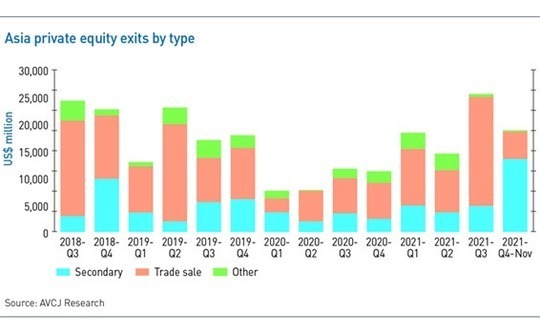
Asia exits: Pass the parcel

Sponsor-to-sponsor exits are set to reach a record high in Asia this year as private equity firms increase velocity of deployment and some strategics remain in a pandemic-induced funk
Allegro Funds has completed three exits this year – favorable outcomes involving retail businesses the Australian private equity firm had turned around, but in each case the inability of international buyers to conduct comprehensive, in-person due diligence impacted the exit process.
"With businesses that are more tactile, buyers want to be able to travel and see the asset firsthand," says Fay Bou, a managing director at Allegro. "There have been deals in industrial services where due diligence was conducted without being in-market. But for retail, most buyers want to see the stores, walk the floors, and meet the management team. Using third parties isn't the same."
Best & Less Group, a baby and kids retailer, listed in July, allowing Allegro to sell part of its stake. This followed a dual-track IPO and trade sale process, which saw several of the most obvious potential buyers show less enthusiasm because they couldn't visit stores in Australia and New Zealand.
It was a similar story with Ngahuia Group and The Interiors Group, which are both based in New Zealand and sell footwear and flooring, respectively. The former was exited via a management buyback supported by high net worth investors, the latter went to local player Pencarrow Private Equity. International trade buyers expressed interest but couldn't back it up with access.
Pencarrow is one of numerous private equity investors that have picked up assets from their peers in the past year, tilting the trade sale balance in Asia towards financial sponsors. A reluctance on the part of strategic buyers to bid aggressively for assets – or bid at all – is one driving factor. Another is the sheer volume of dry powder private equity investors across the region have at their disposal.
"More capital has been raised, so more deals must be done," says Brian Hong, a managing partner and co-head of Southeast Asia at CVC Capital Partners. "Private equity investors don't have the luxury of sitting on the sidelines. A strategic can always use COVID as a reason not to do a deal."
This view is echoed up and down the industry, from large-cap to mid-cap investors, and within the advisory community that serves them. It is often accompanied by the wry observation that "20x is the new 15x" as competition for deals, especially those involving COVID-resilient assets at the top end of the market, is pushing enterprise value-to-EBITDA multiples ever higher.
The phenomenon is not restricted to Asia; indeed, relatively lower private equity penetration means that sponsor-to-sponsor transactions, though fast-rising, still trail more developed markets. One global growth investor, who has seen two out of four exits go to private equity in Asia this year, notes that the share in North America is well above 50%.
"We get calls all the time from private equity trying to buy our companies," the investor adds. "In Asia, bigger funds want to write $300-400 million checks but there aren't many companies like that available. We are getting higher prices from private equity firms than we do from strategics."
Adaptation time
Since 2013, PE investors have exited $386 billion in assets to strategics, nearly three times as much as they have spent buying businesses from one another. On a quarterly basis, sponsor-to-sponsor has exceeded sponsor-to-trade buyer once during this period. However, as of the end of November, the fourth quarter was stacked $13.4 billion-$5.1 billion in favor of sponsor-to-sponsor.
Already, this represents the largest three-month total on record, but it comes from 16 sales. In the fourth quarter of 2019, about 30 deals generated $6 billion. Recent transactions such as Tricor Global (Permira to Baring Private Equity Asia, BPEA), Icon Group (Goldman Sachs, QIC, and Pagoda Capital to EQT), Hexaware (BPEA to The Carlyle Group), and Accordia Golf (MBK Partners to Fortress Investment Group) have really moved the needle.
Sales to strategics in the wake of COVID-19 have also been characterized by a handful of mega-deals. Proceeds slumped to a post-global financial crisis low of $2.6 billion from 58 deals in the first quarter of 2020 as activity froze with the onset of the pandemic. In the last three months of 2019, more than 70 transactions worth $9.5 billion were announced, according to AVCJ Research.

Halfway through 2020, it became clear that investors were adapting to a new normal. Denied the opportunity to touch and feel assets, they began to rely on third-party advisors and virtual site walk-throughs, and perhaps sending smaller due diligence teams through quarantine. In some cases, they had met management teams before COVID-19 struck, which offered a baseline level of comfort.
"People were – and still are – finding ways to do deals," says Paul DiGiacomo, a managing partner at BDA Partners. "The US market has been on fire for two years, but relative to Asia, it is very domestic and hasn't been hampered by border closures. The rebound in M&A volumes and exits in Asia is even more impressive, given the added layer of challenges to what the US and Europe have seen."
Arguably the most visible example of adaption was the $1.2 billion sale of CVC-backed personal care products manufacturer Softex Indonesia to Kimberly-Clark in September 2020. No groundwork was done prior to COVID-19, so CVC helped facilitate comprehensive virtual due diligence. Even then, Kimberly-Clark dispatched people to Jakarta from its US headquarters to inspect factories.
Hong makes two observations. First, virtual only goes so far. For decisions that require a high degree of judgment, such as the character and quality of a CEO, in-person engagement is essential. Second, there will always be demand for market-leading scarce assets. The only other meaningful players in Indonesia's diaper space are multinationals like Unicharm and Procter & Gamble.
Navis Capital Partners points to similar experiences, though viewed through a middle-market lens. Earlier this year, the private equity firm sold Amazon Papyrus Chemicals Holdings, a chemical solutions provider business, to The Longreach Group for around $200 million. There were plenty of logical strategic buyers – and several showed interest – but the bidding was conservative.
"I think they ascribed a lack of visibility discount," says Rodney Muse, a managing partner at Navis. "Strategics need to believe something is highly strategic and synergistic for them to be really aggressive. And it must move the dial. Are they going to take that higher level of risk based on a lower level of access? When it's $200 million rather than a multi-billion-dollar business, it's hard."
In a more recent exit process, Navis only invited financial sponsors because the founder and majority owner of the portfolio company wanted to remain in control. There was no shortage of prospective buyers. Muse notes that "private equity has money burning a hole in its pocket," with Navis currently receiving far more inbound inquiries from financial sponsors than from strategic investors.
Suitable targets
While private equity firms might be willing and able to outbid the competition, relative appetite varies by industry. Two weeks ago, CVC announced the sale of Malaysia-based Munchy Food Industries to Universal Robina Corporation of the Philippines at a 20x valuation. The consensus view is that – as was the case with Softex – strategics find it easier to pay up for fast-moving consumer goods businesses that can be plugged into an existing distribution network.
Corporate services, on the other hand, has proved historically fertile ground for private equity, offering clear platform-style industry consolidation opportunities. Several of the groups that bid for Tricor Global when Permira acquired it in 2016 reengaged when the asset was put up for sale earlier this year. BPEA prevailed with a $2.76 billion bid.
Dan Tan, head of services and technology coverage for Asia Pacific at Permira, observes that business growth and increasing market multiples meant that Tricor was too large for most strategics to swallow. "A couple of the likely buyers were busy doing other transactions, and then the scarcity value made sponsors move the quickest," he adds.
BPEA, which bid the first time around and has existing exposure to corporate services through Vistra Group, cut short the second round of bidding by offering to pay 23x earnings and move immediately to a committed term sheet, according to two sources familiar with the situation. Several industry participants note that this represents an aggressive valuation, given Permira acquired Tricror for 16x.
"We see people trying to preempt deals. Investors are pickier about the situations they dig into – they don't want to be one of 10 chasing a business, so they run hard on the ones they really want," says BDA's DiGiacomo. "Deploying a $5-10 billion fund is challenging. If the recipe for not missing out on something is stretching the valuation and offering deal certainty, that might be reasonable."
Hillhouse Investment is also said to have paid 23x when acquiring mattress brand AI Dream from Advent International in August, one of few China control deals of size. The Blackstone Group picked up clinical trials business Nucleus Network from Crescent Capital Partners for more than 20x, one of several recent examples of Australian deals crossing that valuation threshold.
Mark McNamara, a partner at King & Wood Mallesons, adds that financial sponsors in Australia increasingly target businesses that have real assets exposure through core-plus infrastructure funds rather than private equity vehicles. They can bid up for assets because they are underwriting to lower returns. EQT used its infrastructure strategy to acquire Icon, a radiology clinic chain.
Logical outcomes
There are plenty of situations in which selling to another private equity firm makes strategic as well as financial sense. Assets are increasingly passed up the chain in terms of size. Blackstone could point to the success TPG Capital has enjoyed with Novotech, a clinical trials business it acquired from Mercury Capital in 2017 and helped expand geographically, as a model for Nucleus Network.
Even when businesses are traded between sponsors of roughly equal size, there are angles that can be pursued based on a particular geographical or sectoral expertise. For example, part of Hillhouse's thesis for AI Dream could be deepening the reach and range of the brand in China, while BPEA may leverage Vistra's knowledge and network to deliver additional value to Tricor.
"The old rules don't apply. It's no longer ‘buy at 8x, sell at 12x,' it is ‘buy standalone at fair market or even above fair market, and add value,'" says Andrew Thompson, head of private equity and sovereign wealth for KPMG in Asia Pacific.
"GPs used to talk about value creation to help fundraising, but now it's completely core and operationally embedded – and if it's not, you won't be competitive as a GP. With few proprietary or low-competition deals, especially in developed markets, investors must pay fully then add value."
Straive, a Philippines-based outsourcing business, carries an unusual distinction within Asian private equity as a company that has seen five different iterations of investor or owner since the 1990s. Originally a business process outsourcing player called SPi Global, it has evolved in scope and scale over time, potentially offering each buyer some new growth avenues.
CVC, the majority owner between 2013 and 2017, exited via three divestments of different operations. The last and largest piece, as well as the name, went to Partners Group. In 2020, Partners Group completed a bolt-on of India-based education technology specialist LearningMate, which has since flourished with the pandemic-driven switch to online learning.
When the company was put up for sale earlier this year, LearningMate was crucial to a rich valuation, according to the second source familiar with the situation and a third source. BPEA ended up buying Straive but CVC – keen to access a new growth story in a familiar context – was among the bidders.
Businesses that have demonstrated resilience to COVID-19, or are benefiting from it, like LearningMate, are the easiest to sell because underwriting pandemic impact is less challenging. Another point of difference between private equity and strategics is the former's willingness to put in the work and take a view on this impact, which may, in turn, be driven by the need to do deals.
"Private equity investors crunch the numbers, and if the price is right, they can see it happening. There are show-stopper issues, such as major exposures beyond the purchase price and regulatory obstacles that cannot be overcome, but private equity buyers are good at quantifying risk in their minds and giving it a valuation," says Maurice Hoo, a partner at Morgan Lewis.
"They are faster in making those decisions than strategic investors. With strategics, because of the corporate structure, it might be a question of how many people are willing to take responsibility when they don't know how certain risks will pan out or how the culture is or isn't going to jive."
Sustainable trend?
At the same time, when private equity firms buy from one another, there is an element of second-guessing. On one hand, they draw comfort from dealing with a counterparty they know and whose processes might be akin to their own. Muse of Navis describes it as a "lower-risk way to deploy money," especially in geographies like Southeast Asia where founders are often less sophisticated.
On the other, there is a recognition that this counterparty knows exactly how to package an asset to appeal to private equity. They must dig into the story, establish what percentage is real as opposed to tailored, and decide whether there is sufficient uplift that can be extracted from the asset.
It remains to be seen whether the swing in momentum from sponsor-to-trade buyer to sponsor-to-sponsor is sustainable, making these dynamics even more pervasive. Any analysis inevitably asks broader questions about global macroeconomic policy and the availability of liquidity. Several investors warn that the current environment is encouraging a dangerous level of aggression and risk-taking that amounts to a rewiring of the private equity model.
"People are trying to put money to work faster, so they can raise new funds sooner," claims one pan-regional buyout manager. "The model used to be that you raise a fund every five years and invest 20% a year, but now people are coming back after two years. Everyone is in deal-making mode, and that's why valuations are skyrocketing."
Previous experience in other markets suggests that LPs will become impatient if assets are increasingly passed between private equity firms, especially if they are paying fees on both sides and there isn't a clear-cut next-generation growth story. For better or worse, the industry now has a readymade solution: single-asset continuation funds.
Latest News
Asian GPs slow implementation of ESG policies - survey
Asia-based private equity firms are assigning more dedicated resources to environment, social, and governance (ESG) programmes, but policy changes have slowed in the past 12 months, in part due to concerns raised internally and by LPs, according to a...
Singapore fintech start-up LXA gets $10m seed round
New Enterprise Associates (NEA) has led a USD 10m seed round for Singapore’s LXA, a financial technology start-up launched by a former Asia senior executive at The Blackstone Group.
India's InCred announces $60m round, claims unicorn status
Indian non-bank lender InCred Financial Services said it has received INR 5bn (USD 60m) at a valuation of at least USD 1bn from unnamed investors including “a global private equity fund.”
Insight leads $50m round for Australia's Roller
Insight Partners has led a USD 50m round for Australia’s Roller, a venue management software provider specializing in family fun parks.







